Культура и цивилизация. Рубрика в журнале - Сервис plus
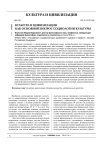
"Культура и цивилизация" как основной вопрос социологии культуры
Статья научная
Понятия «культура» и «цивилизация» в обыденном языке употребляются как синонимы. Но для философии и культурологии разделение этих понятий - вопрос принципиальный. И дело не только в том, что на идее противопоставления культуры и цивилизации построено большинство культурологических концепций XIX и XX веков. Что более существенно, сам ход исторического процесса в Европе и России наглядно показывает, что ценности культуры и цивилизации не только не совпадают, но и находятся на различных полюсах системы ценностей. Мы стали очевидцами, как современная цивилизация буквально вытесняет многовековые завоевания человечества в сфере Духа. Цивилизация и культура, понятые в качестве оппозиционных понятий, позволяют сопоставить их с «духовно-тварной» природой человека, его дуальностью и противоречивыми тенденциями в его духовном бытии. Понятия цивилизации и культуры в статье понимаются как совокупность материальных ценностей (цивилизация) и ценностей духовных (культура). Автор убежден, что в такой интерпретации эти системы приобретают трагический характер. Игнорирование цивилизационных вызовов современному миру чревато превращением человека в специалиста, его жизни в работу. В рамках «цивилизованных» отношений человек рискует деградировать до штамповки, социального эрзаца, потеряв собственно человеческие качества, индивидуальность, лицо, уникальность. Развитие техногенной цивилизации в ущерб культуре грозит нам нивелировкой духовных ценностей, накопленных человечеством веками. А значит, наша история рискует превратиться в дорогу в никуда.
Бесплатно
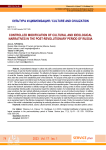
Статья научная
Unprecedented changes in culture and public consciousness were observed in the post-revolutionary period of Russia. It was then that the transition was made from the established norms of culture and society to completely new concepts dictated by the ideology of socialism. The reflection of changes in public consciousness was observed in all spheres of social life. However, despite the apparent spontaneity of the changes, it is necessary to realize that all transformations were under the control of the established power of the Bolsheviks. The purpose of this paper is to comprehensively examine the socio-cultural aspect of problems faced by Russian society and the newly formed government after the fateful revolution of 1917. This turning point in history led to a profound rupture of the established ideological, social and cultural structure, which had been formed before under the influence of a long patriarchal-imperialist system. Overcoming this challenging phase required the Bolshevik authorities to skillfully manage two distinct imperatives: seizing control of diverse cultural narratives and purposefully directing public consciousness toward the collective creation of a fundamentally new socialist reality. This paper scrutinizes the main methods effectively employed by the Bolsheviks in an era of profound social division. In addition, the paper critically explores the definition and immense importance of material and audiovisual symbols in the process of creating and affirming new cultural ideas. Emphasizing the pervasive role of symbols at all stages of "new age" identity formation, including their integration into the educational system. The assumption is made that the post-revolutionary era serves as an exemplary basis for the effective management of ideological aspects of society. Finally, the necessity of modern application of this model is substantiated, emphasizing its continuing relevance in the conditions of the modern world.
Бесплатно
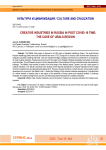
Creative industries in Russia in post COVID-19 time: the case of Urals region.
Статья научная
The Middle Urals region is famous for its 300 years of industrial metallurgy history. The world-famous Russian metallurgy plants were built and worked here since 1702. During the XX century some of them were destroyed or replaced, but plants’ buildings still exist. This rich industrial heritage nowadays has become a fundament for a uniqueness of Urals creative industries. Russian government and The Agency for Strategic Initiatives developed a program to renovate such territories. This all-Russian program is for the transformation of the territories of former industrial zones and abandoned buildings. The Middle Urals became a leader of the third stage of the federal project Creative Lab and a pilot region for creative industries. This article is devoted to the analyze of the regional development of creative industries and the usage of former industrial zone and abandoned buildings for it. There are several directions in which the work of the creative sector development is occurred in the Middle Urals: 1) writing the Strategy of the creative industries development; 2) development of a whole network of creative sites in the region on the territories of former plants and industrial facilities; 3) business education for creative entrepreneurs and new university educational standards for creatives industries.
Бесплатно
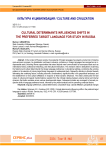
Cultural determinants influencing shifts in the preferred target language for study in Russia
Статья научная
In the context of Russian society, the popularity of foreign languages has played a pivotal role in fostering socio-economic progress. As globalization continues to advance, proficiency in foreign languages has emerged as an indispensable asset, unlocking diverse opportunities that extend beyond mere communication to encompass facets such as international travel, professional networking, and intercultural interactions. This research article is dedicated to examining the historical and cultural determinants that shape language preferences in educational settings, scrutinizing the evolving patterns in the selection of primary target foreign languages for widespread study. Noteworthy attention is directed towards delineating the underlying factors, including economic considerations, significant shifts in the geopolitical landscape, and the establishment of new cultural affiliations in response to these dynamic influences. The article underscores the fluid nature of cultural and linguistic transformations resultant from the intricate interplay between external stimuli and internal dynamics that define societies across various developmental stages. Subsequent studies are envisaged to forecast prospective shifts in language preference trends, informed by the present analysis and the prevailing contextual factors.
Бесплатно
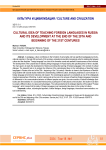
Статья научная
In pedagogy, culture contributes to the formation of personality and has significant pedagogical and educational potential. In the late 20th and early 21st centuries, educational scientists increasingly note the relationship between culture and the discipline "Foreign language" as a fact of the formation moral and aesthetic consciousness of the individual. The development of the cultural idea in teaching foreign languages in Russia during the specified period of time is studied. The main goal is to study the development of factors promoting the learning of foreign languages in the context of cultural dialogue. The research task is to analyze the influence of the culturological idea on the methodology of teaching foreign languages in Russia at the end of the 20th - beginning of the 21st century. Attention is drawn to the importance of familiarizing students with cultural studies material for understanding a different culture, developing readiness to communicate in a foreign language environment, tolerance and respect. The culturological approach is considered as one of the strategically important approaches of that time, in which culture acts as the core in the process of teaching foreign languages. Examples of differences in the communicative behavior of different peoples are given; the main sources of cultural knowledge (textbooks) are demonstrated. It is concluded that becoming a participant in intercultural communication, the student must learn to accept a different culture, its values and advantages. The cultural potential is the strategic objective of the subject "Foreign language", which means that the study of foreign languages must necessarily take place in the context of culture.
Бесплатно
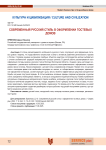
Cовременный русский стиль в оформлении гостевых домов
Статья научная
В статье рассматриваются особенности русского стиля, популярного для оформления гостевых домов и квартир, что представляется актуальным в связи с активным развитием регионального туризма в России. Стилевое решение интерьеров подобных объектов индустрии гостеприимства должно выбираться с учетом особенностей традиций материальной культуры региона. В данной работе рассматривается опыт оформления гостевых домов в русском стиле в Вологде, Вологодской области и Суздале. Цель настоящего исследования – рассмотреть особенности современного русского стиля применительно к оформлению гостевых домов и мини-гостиниц. Тема исследования – русский стиль в современном интерьере. Помимо того, что русский стиль в последнее время стал необычайно популярен и в жилых, и в общественных интерьерах, оригинальное оформление интерьера, соответствующее «духу» места, является эффективным средством конкурентной борьбы на рынке посуточной аренды. В статье выявлены основные приемы создания интерьеров в русском стиле, определены необходимые элементы, из которых складывается подобный интерьер. Помимо применения натуральных традиционных материалов для отделки и мебели, интерьеры в русском стиле требуют включения большого количества предметов (текстиль, посуда, предметы быта и декора), выполненных на заказ, что возможно реализовать, привлекая местных мастеров и художников. Эти приемы могут быть предложены как некий алгоритм проектирования студентам-дизайнерам, которые работают над дизайн-концепиями проектов, где требуется решение в русском стиле.
Бесплатно
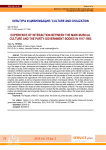
Статья научная
The article deals with the experience of the functioning of Mari music in the Soviet period (1917-1985). The relevance of the topic is determined by the lack of comprehensive studies on the problem of formation and development of musical culture of the Mari ASSR in the context of interaction with power structures. The study of the processes of development of ethnic cultures is important for the critical understanding and creative use of the experience gained in the Soviet period for the further improvement of the interaction between national cultural centres and state bodies. Understanding of the stages of origin, development and integration of the cultures of different peoples of the country will help to raise their status in society, further integration into the cultural space of Russia. Aim of the work: to understand the experience of interaction of different branches of the Mari musical culture and party-government bodies and to identify the lessons. The object of the study is the process of formation and development of Mari musical culture in the period 1917-1985. Empirical basis of the research was the Mari musical culture in connection with the activities of Soviet and party bodies, educational and cultural institutions and organisations in the Soviet period from 1917 to 1985. Systemic, complex and axiological approaches were applied, as well as comparative-historical and problem-chronological methods. The analysis allowed us to identify the factors contributing to the formation of professional Mari musical culture in the period 1917-1985. As a result of the understanding of the experience of interaction between musical, state and public institutions, a number of lessons have been learned in relation to the issues of further development of culture in the Republic of Mari El. The study of the historical processes of the above-mentioned period allows us to conclude that the authorities, organisations and institutions, famous creative and political leaders had a favourable influence on the development of Mari culture in the Soviet period, despite the ideological constants.
Бесплатно
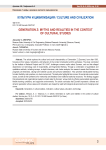
Generation Z: myths and realities in the context of cultural studies
Статья научная
The article explores the cultural and social characteristics of Generation Z (Zoomers), born after 1995, focusing on their values, motivations, and behaviors in the context of education and the workplace. The study, conducted by the Institute of National Projects and GK LANIT, challenges common myths about Zoomers, such as their alleged dependence on technology, lack of responsibility, and fragmented thinking. Through a combination of quantitative and qualitative methods, including surveys, in-depth interviews, and cluster analysis, the research reveals that Zoomers are pragmatic yet hedonistic, valuing both material success and personal satisfaction. They prioritize individualized learning formats, flexibility, and a positive, non-toxic environment. The study also highlights their concern for social and environmental issues, as well as their preference for mentorship and feedback over traditional authority structures. The findings suggest that educational and organizational systems should adapt to Zoomers’ unique traits by offering personalized approaches, flexible learning conditions, and supportive environments. The article concludes that Zoomers represent a diverse and dynamic generation whose values and motivations are shaped by rapid technological advancements and changing social norms.
Бесплатно
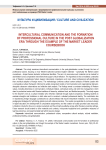
Статья научная
This study examines intercultural communication in the post-globalization context through the lens of professional culture, focusing on how Western- authored business English materials – specifi cally the Market Leader coursebook – shape Russian students’ professional identities. The aim is to reconceive such materials not as models for assimilation but as comparative instruments that support critical refl ection. The hypothesis is that a mediated, contrastive use of Western coursebooks fosters deeper intercultural competence and more robust professional self-identifi cation than uncritical adoption of foreign norms. The methodology combines cultural content analysis of Market Leader with a comparative cultural framework informed by widely recognized models of communication and organizational behavior, alongside classroom observations and refl ective task analysis. The fi ndings reveal a consistent embedding of Western values, including directness in communication, individual initiative, contractual clarity, and strict time management, which stand in productive tension with Russian traditions of hierarchy, relational trust, and fl exible temporality. The study argues for the teacher’s role as a cultural mediator who reframes materials through explicit comparison, enabling students to evaluate strengths and limitations on both sides and to construct a situated professional identity. The contribution lies in repositioning foreign language coursebooks as cultural artifacts that require interpretive mediation, and in articulating pedagogical strategies for hybridizing global input with national practices. The results are applicable to curriculum design in higher education, the development of comparative assignments, and the creation of locally grounded case resources. Limitations include the focus on a single coursebook and the primarily qualitative scope within Russian university settings. Future research should extend to other materials and contexts, incorporate longitudinal and quantitative measures of learning outcomes, and experimentally test hybrid resource design.
Бесплатно
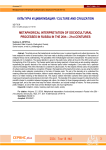
Metaphorical interpretation of sociocultural processes in Russia in the 20th - 21st centuries
Статья научная
The article proves that metaphorical constructions occur in various linguistic and cultural phenomena. We have analyzed the works of several authors, who have made a deciding contribution to the investigation of the essence of metaphor theory and its understanding. The specialties of the methodologies have been characterized. The poetic texts are especially rich in metaphors. The special attention is given to the poetic texts, written at the end of the 20th century and at the beginning of the 21st century. The Russian poetic texts are being analyzed: in these texts we are revealing metaphors, representing the specific features of the cultural and historical period under investigation. Every nation has a particular volume of knowledge. Part of this information is contained in cultural codes. For the analysis of these codes, the peculiarities of cultural customs and traditions, conception of Russia in the beginning of the twenty-first century, we are using the method of decoding poetic metaphor constructions in the texts of Russian poets. The aim of the decoding is to understand the meaning content and cultural information, hidden in poetic metaphors. It is concluded that metaphor has a hidden meaning, which is a hidden meaning of the literature text. This implicit, subtext information contains ethno-cultural and historical meaning and represents sociocultural environment of the epoch. The topicality of the present research is determined by the scientific interest in correlation between language and culture, the interest in those language elements, which enrich the language itself, and at the same time keep the historic information, and cultural heritage of nations. For these processes poetic metaphor, as one of the most common literature tropes, has much significance.
Бесплатно
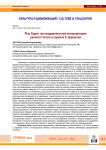
Play Gogol: постмодернистская интерпретация раннего Гоголя в сериале Е. Баранова
Статья научная
На художественно-визуальном материале сериала Е. Баранова «Гоголь» исследуется перекодировка литературного текста Н. В. Гоголя в современном кинематографическом сознании. Выявлены параллели романтического литературного языка с визуальным киноязыком современности на уровне как художественных приемов, так и антропологических идеалов. Эстетика и поэтика сериала «Гоголь» подвергается анализу сквозь призму концепции клипового сознания. Фрагментарность композиции повести Н. В. Гоголя «Страшная месть» соотносится с принципом сериальности, который в XXI веке как культурный код успешно интегрирован в художественный текст, высказываются предварительные выводы о разной природе данных приёмов. С другой стороны, в статье на примерах нескольких различных экранизаций текстов Н. В. Гоголя показано, что сама авторская позиция писателя провоцирует экранные рецепции на включение образа Гоголя в художественный мир его персонажей, что обосновывает анализ сериального Гоголь-мира, проведенный авторами статьи...
Бесплатно
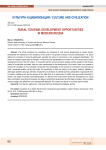
Rural tourism: development opportunities in modern Russia
Статья научная
The article considers the possibilities and prospects of rural tourism development in modern Russia, emphasises the importance of the existence of this sector in the general concept of tourism development. The author defines the concepts of rural and agrotourism, specifies the types of rural tourism in the proposed classification. The history of emergence goes back to Antiquity, in Russia the first manifestations are noted in the XVII century and a leap in development occurs in the XIX century. In connection with the current economic situation and the situation in the Russian market of countryside real estate, there are clear prerequisites for the development of this sector, there is an increase in demand for recreation in the countryside. Among the main advantages of rural tourism for consumers are small financial costs, convenient location not far from cities, the opportunity to study the history of the region, customs, traditions, a wide target audience (any age, interests, employment, social status of potential tourists), participation in agricultural work. In modern conditions and with the support of the state there is an opportunity to create micro and small businesses in Russia. The stages of creation and implementation of a startup in the rural tourism sector are: development of a unique idea, confirmation, launching the business, the stage of growth and development and the stage of scaling. With a properly chosen strategy and adherence to the development algorithm, the creation and launch of a startup seems realistic.
Бесплатно
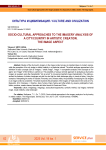
Статья научная
Studies of the city/country imagery in the image context occupy an important place in modern science, while the perception of the city image in artistic creativity is of particular interest. The article analyzes approaches to the definition of basic concepts such as "imagery", "artistic image", "image". A comparative analysis of the concepts of "imagery" and "image" of the territory is carried out. The possibility of using a semiotic approach to analyzing a city/country imagery is revealed, using the characteristic "city as a text" in conveying important image characteristics. The article examines the features of modern landscape art and the role that the urban landscape plays in visual art today. Using the example of interpreting the works of Russian (Primorsky) and Chinese artists, the possibility of analyzing the city imagery in an image context is considered. The article examines the perception of the imagery of Vladivostok in the works of A.Ya. Matyukhin, S.M. Cherkasov, I. Obukhov, Song Yuming, Wang Yaohua and other artists, by viewers, participants of exhibitions, auctions, master classes, biennales and other events in Russia and China.
Бесплатно
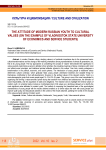
Статья научная
In modern Russian culture, studying values is of particular importance due to the pronounced socio-cultural transformations and the change of life-meaning orientations among representatives of almost all generations, but, first of all, young people. The key approaches to considering the concept of “values” demonstrate their significance in various periods, determining a person’s attitude to their activities, the prevailing meanings of being, compliance with moral and ethical social principles, and traditional spiritual attitudes inherent in the culture. Over time, society undergoes a transformation in the political, economic, and social spheres. The introduction of young people to traditional values determines cultural continuity, which gradually helps young people understand essential and valuable things for themselves, contributing to their self-development, focusing on the spiritual values of the relevant society. Youth is a socio-demographic group that covers people aged 14-16 to 25-35 years. This group is one of the most complicated in organizing and forming a value-semantic sphere during the transition from childhood and adolescence, the formation of social responsibility, and the acquisition of rights and obligations. The research aims to highlight the terminal values of modern youth. An empirical study involving a morphological test of life values as a technique allowed us to identify the most significant value attitudes for modern youth. The method of comparing the theoretical basis of the psychological characteristics of young people with the results obtained enabled us to further adjust the work with young people and improve youth policy and educational activities in the context of the results obtained, justifying the novelty in the changes in the value-semantic sphere of modern youth.
Бесплатно
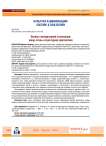
The groundwork of literary stylization: genre, style, and cultural pragmatics
Статья научная
The purpose of the best aesthetically valid translation of a poetic work can be best achieved through stylization. From the linguistic point of view stylisation is “an imitation of a manner, or narrative style, etc, typical of some genre, social milieu, time in history, etc, usually aiming at creating an impression of authenticity” (Akhmanova, 1969). Normally a writer, aiming at creating the said effect, never tries to reproduce an exhaustive set of the peculiar genre features of imitated text, but thinks in terms of the “necessary and sufficient” amount of conceptually and linguistically specific features bearing the main load in creating a particular effect. A researcher, whose task is to reveal these features, should probably begin by making a complete list of stylistic devices used by the author, and then consider their relative functional significance in producing a desired impact. The results of such study appear to be of a high practical value for a translator, who invariably faces the problem of the balance between conceptually significant elements and emotional-expressive “decorators”.
Бесплатно
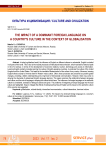
The impact of a dominant foreign language on a country’s culture in the context of globalisation
Статья научная
In today's globalized world, the influence of English on different cultures is undeniable. English is studied in all parts of the world. This is due to the natural processes of intercultural interconnection, which reached its historical peak in the 21st century, in terms of the development of economic relations, tourism, technology and access to information. Learning English certainly includes learning the culture of English-speaking countries, in particular the culture of the United Kingdom and the United States. This leads to the inevitable Westernization of the culture of any country. Moreover, learning English allows society to immerse itself in Western mass culture. Often, these processes are perceived as positive global changes, providing a better understanding and a high level of intercultural communication. However, there may come no denying the downside of widespread English language learning. This paper examines the relationship between language and culture, and the role of language in shaping the cultural ethnic base. The influence of a foreign language on the authentic culture is considered, examples of bilingual cultures are given. The problems of integrating a foreign language into the local culture are highlighted. Ways to mitigate the effects of widespread learning of English and its impact on the authentic culture of the country are suggested.
Бесплатно
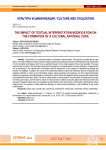
The impact of textual interpretation modification on the formation of a cultural national code
Статья научная
The society is in a continuous process of formations transformation. This process is conditioned by many factors. Formation shifting in modern society is mainly caused by the growing processes of informatization and development of communication technologies, which have a significant impact on the cultural aspect of the social mentality. This paper examines the concepts of the information society and its impact on the cultural aspect of human civilization. It discusses the role of technology in the transmission of information and the importance of sign systems in facilitating the storage and transfer of knowledge. In addition, the nature of the relationship between culture and information flows is emphasized and explained, attention is drawn to how information shapes cultural processes and practices, and how cultural frameworks influence the generation and dissemination of information. Moral, ethical and aesthetic factors governing the dissemination of information are examined in detail. The role of cultural values in communication, the importance of cultural texts as carriers of meaning and values, and the dynamic nature of cultural values in relation to specific cultural and historical contexts are discussed. Classical cultural texts are considered as a benchmark for the transmission of information containing the cultural national code. The question is raised about the distortion of cultural texts interpretation in the conditions of the society informatization.
Бесплатно
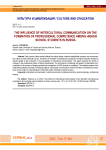
Статья научная
Each country's labor market reflects the cultural values, historical established concepts, and communication culture of each individual country. Therefore, the formation of professional competence of higher education students is directly related to the immersion in the peculiarities of intercultural communication. This paper examines the trends of changes in the professional culture of future professionals. The importance of mastering the aspects of intercultural communication in the process of shaping professional competence of HSE students is considered. The detailed analysis of the relationship between the study of individual subjects, intercultural communication and the formation of professional competence in the context of cultural features of the labor sphere of foreign countries is given.
Бесплатно
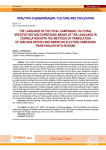
Статья научная
In the modern world politics play an immensely important role, determining social, economic, humanitarian and cultural development of countries. Democratization of state institutions and rapid development of information technologies, have created new ways for citizens to participate in the political life of the country. This function is executed by political advertising. To meet the many different needs that contributed to the emergence of the phenomenon of political advertising, and due to the development of new technology, the media and the Internet, rapid, widespread changes in political advertising have occurred, it has actualized and new types and classifications have appeared. In the context of globalization, when people from different parts of the world and cultures are becoming closer to each other, there is a need to reduce the communication gap by studying the worldview of people who speak different languages. This is facilitated by quality translation that takes into account all the subtleties of highly imaginative texts, which include political advertising. The aim of the study is to find ways to translate political speeches into Russian preserving the style and linguocultural peculiarities of political texts of various genres, while retaining their semantic and pragmatic functions. The subject of the study is linguocultural peculiarities of political campaings, explicit and implicit means of presenting information, linguistic ways of achieving perlocutionary effect and suggestive methods of manipulating public opinion, as well as various methods of translating political advertisements of different genres from English into Russian without loss of imagery or layers of meaning. The object of the study is political advertising in the US and UK in years 2000 to 2020. Included in this article are some of the examples of the use of culture-specific elements in different genres of political advertising in the US and the UK and their translation, which are part of a larger ongoing study by the same author.
Бесплатно
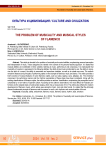
The problem of musicality and musical styles of flamenco
Статья научная
This article is devoted to the problem of musicality and musical abilities, emphasizing personal perception and interpretation of music. These categories are viewed in the context of the personal-activity approach. It is stated that musical abilities are manifested in three varieties: listening to music, performing it and composing. It is emphasized that musicality of a person is expressed in the following abilities: the ability to feel music emotionally by ear, the ability to recognize the pitch of a sound, the ability to remember and reproduce melodies, as well as to create new ones. The authors reveal the features and principles of performing styles on the example of flamenco music and dance. The article provides a brief overview of musical features of some flamenco styles, such as solea, sigiriya, cana, allegrias, etc. The emotional component, the performing manner and the rhythmic peculiarities of these styles have been considered. Along with the existing classifications of flamenco styles, the article provides an authors’ classification, emphasizing the perception level of complexity by a non-native of Spanish culture. According to the authors' observations, the most difficult for Russian performers are the original styles of cante jondo singing, which has a musical size of 3/4. The article also reflects the modern development of flamenco music, which widely uses elements of jazz, rock and other trends. It is stated that the ethnically diverse fundamental principle of flamenco was the reason for such a rich rhythmic and musical palette of this art.
Бесплатно

